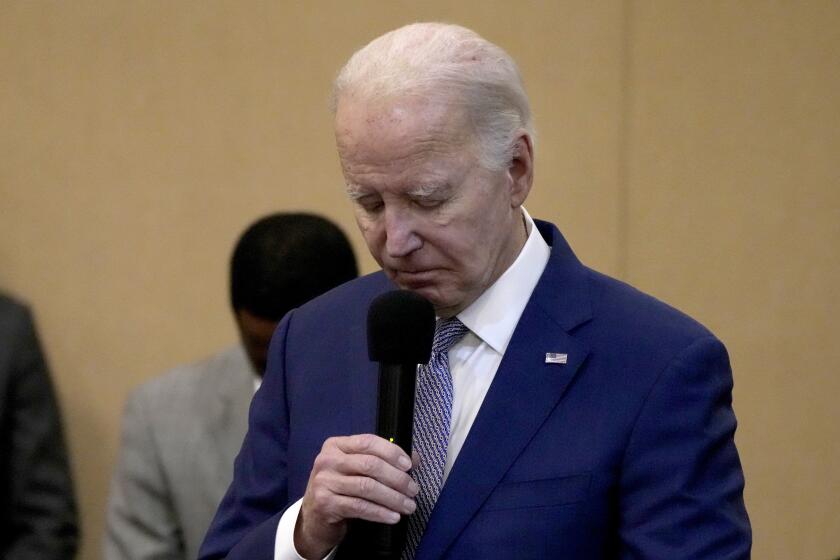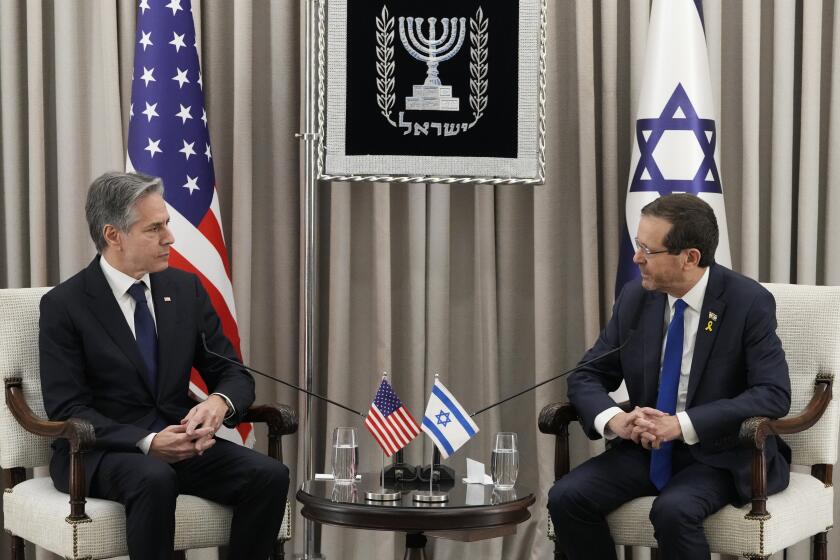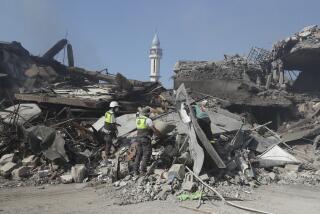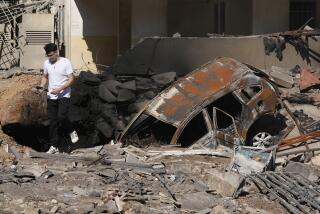Drone strike in Baghdad kills high-ranking militia commander, officials say
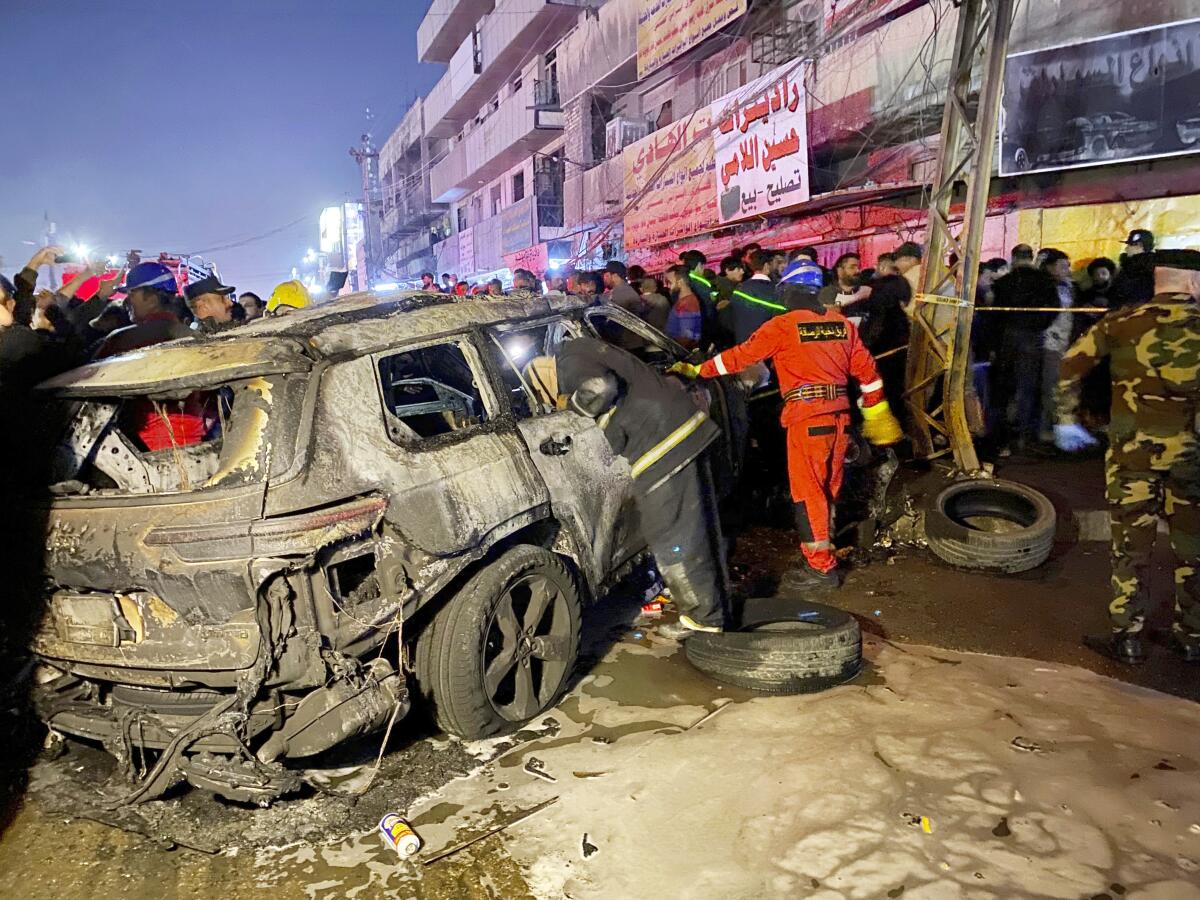
- Share via
BAGHDAD — A U.S. drone strike blew up a car in the Iraqi capital Wednesday night, killing a high-ranking commander of the powerful Kataib Hezbollah militia who is responsible for “directly planning and participating in attacks” on American troops in the region, the U.S. military said.
The strike came on a main thoroughfare in the Mashtal neighborhood in eastern Baghdad, attracting a crowd as emergency teams picked through the wreckage. It came amid roiling tensions in the region, and is likely to further anger Iraqi government leaders, who U.S. officials said were not notified before the strike.
Security forces closed off the heavily guarded Green Zone, where a number of diplomatic compounds are located, amid calls for protesters to storm the U.S. Embassy.
There were conflicting reports on the number killed, with U.S. officials saying the initial assessment was one, and saying there were no civilians hurt or killed. But two officials with Iran-backed militias in Iraq said that three died, including Wissam Muhammad Sabir Al-Saadi, known as Abu Baqir Al-Saadi, the commander in charge of Kataib Hezbollah’s operations in Syria. Kataib Hezbollah announced Abu Baqir’s death “following the bombing of the American occupation forces” in a statement.
Those officials spoke on condition of anonymity because they weren’t authorized to speak to journalists.
In a statement, U.S. Central Command said “there are no indications of collateral damage or civilian casualties at this time.” It added that the U.S. “will not hesitate to hold responsible all those who threaten our forces’ safety.”
The strike came days after the U.S. military launched an air assault on dozens of sites in Iraq and Syria used by Iranian-backed militias and the Iranian Islamic Revolutionary Guard in retaliation for a drone strike that killed three U.S. troops in Jordan in late January.
The deadly drone attack in Jordan is threatening to upend the Biden administration’s delicate effort to prevent the Israel-Hamas war from spiraling into a broader regional conflict.
The U.S. has blamed the Islamic Resistance in Iraq, a broad coalition of Iran-backed militias, for the attack in Jordan, and officials have said they suspect Kataib Hezbollah in particular of leading it.
The Islamic Resistance in Iraq has regularly claimed strikes on bases housing U.S. troops in Iraq and Syria against the backdrop of the ongoing Israel-Hamas war, saying that they are in retaliation for Washington’s support of Israel in its war in Gaza that has killed 27,707 Palestinians, according to the Health Ministry in the Hamas-run territory.
Kataib Hezbollah had said in a statement that it was suspending attacks on American troops to avoid “embarrassing the Iraqi government” after the strike in Jordan, but others have vowed to continue fighting.
On Sunday, the Islamic Resistance in Iraq claimed a drone attack on a base housing U.S. troops in eastern Syria killed six fighters from the Syrian Democratic Forces, a Kurdish-led group allied with the United States.
The latest surge in the regional conflict came shortly after Israeli Prime Minister Benjamin Netanyahu on Wednesday rejected terms proposed by Hamas for a hostage-release agreement that would lead to a permanent cease-fire, vowing to continue the war until “absolute victory.”
Netanyahu’s rejection of a Hamas proposal, made as Secretary of State Blinken was in the region to try to broker a cease-fire deal, signaled that the painstaking diplomacy could be derailed.
Also on Wednesday, the media office of the Houthi rebels in Yemen reported two airstrikes in the Ras Issa area in Salif district in Hodeida province.
Madhani reported from Washington. Associated Press journalists Ali Jabar in Baghdad and Lolita Baldor in Washington contributed to this report.
More to Read
Sign up for Essential California
The most important California stories and recommendations in your inbox every morning.
You may occasionally receive promotional content from the Los Angeles Times.
